GI Abnormalities in Scleroderma Save

A prospective Scleroderma Cohort Study found that gastrointestinal tract (GIT) involvement was common and negatively impacted quality of life, physical function, and employment, but had no effect on mortality.
The Australian Scleroderma Cohort Study enrolled 907 consecutive systemic sclerosis (SSc) patients - all of whom completed the University of California, Los Angeles, Scleroderma Clinical Trials Consortium Gastrointestinal Tract 2.0 Questionnaire (UCLA GIT) between 2015 and 2021.
GIT involvement was reported in 87% of SSc patients, with 46% to 52% having moderate to very severe symptoms of reflux, distension, diarrhea, and constipation.
In the multivariable analysis, moderate and severe to very severe total scores, reflux scores, and distension scores were associated with worse physical function, QoL, fatigue, anxiety, depression, and unemployment. UCLA GIT total scores were not independently associated with death in our cohort.
Another report in Rheumatology looked at small bowel involvement in 130 SSc patients, assessed prospectively by scintigraphy-based whole gut transit (WGT) study.
They found 17% (22/130) of SSc patients with abnormal small bowel transit. Those with abnormal small bowel transit were more likely to be male (OR=3.7), have more severe cardiac involvement (OR = 3.98), greater mortality (HR=4.57), but less sicca symptoms (OR = 0.30).
From both of these studies, GI involvement is quite common in SSc, but only small bowel involement (assessed by gut transit time) impacts mortality.










If you are a health practitioner, you may Login/Register to comment.
Due to the nature of these comment forums, only health practitioners are allowed to comment at this time.